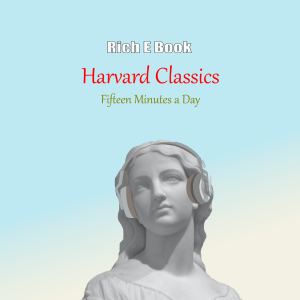
279.5K
Downloads
736
Episodes
Former President of Harvard University Charles W. Eliot wrote in his introduction to the Harvard Classics, "In my opinion, a five-foot shelf would hold books enough to give a liberal education to any one who would read them with devotion, even if he could spare but fifteen minutes a day for reading." Here you are, you can easily listen to his entire 15-minutes-a-day study guide while commuting to and from work (most of us spend far more than 15 minutes a day commuting each day), doing mundane work in the office, washing dishes at home, or doing most of the things day in and day out. It is so easy, so entertaining, and so educational that they can be listened to again and again, until they permeate into our own thinking and into our characters. Perhaps, in one year's time, you will become someone you barely recognize, all for the better. Who knows?
-- Rich E Book
Former President of Harvard University Charles W. Eliot wrote in his introduction to the Harvard Classics, "In my opinion, a five-foot shelf would hold books enough to give a liberal education to any one who would read them with devotion, even if he could spare but fifteen minutes a day for reading." Here you are, you can easily listen to his entire 15-minutes-a-day study guide while commuting to and from work (most of us spend far more than 15 minutes a day commuting each day), doing mundane work in the office, washing dishes at home, or doing most of the things day in and day out. It is so easy, so entertaining, and so educational that they can be listened to again and again, until they permeate into our own thinking and into our characters. Perhaps, in one year's time, you will become someone you barely recognize, all for the better. Who knows?
-- Rich E Book
Episodes

Wednesday Dec 01, 2021
Introductory Note: George Berkeley
Wednesday Dec 01, 2021
Wednesday Dec 01, 2021
Introductory note on George Berkeley (Volume 37, Harvard classics)

Wednesday Dec 01, 2021
Three Dialogues Between Hylas and Philonous (The First Dialogue), by George Berkeley
Wednesday Dec 01, 2021
Wednesday Dec 01, 2021
Offhand we say a skeptic is one who doubts everything. But does he? And are his doubts caused by too much learning, or too little? Berkeley presents both sides of skepticism. (Volume 37, Harvard Classics)

Tuesday Nov 30, 2021
Introductory Note: Jonathan Swift
Tuesday Nov 30, 2021
Tuesday Nov 30, 2021
Introductory note on Jonathan Swift (Volume 27, Harvard classics)

Tuesday Nov 30, 2021
Hints Towards an Essay on Conversation, by Jonathan Swift
Tuesday Nov 30, 2021
Tuesday Nov 30, 2021
To harp on one's illnesses, giving all the symptoms and circumstances, has been a blemish on conversation for ages. Two hundred years ago Swift complained of persons who continually talked about themselves. (Volume 27, Harvard Classics)
Jonathan Swift born Nov. 30, 1667.

Monday Nov 29, 2021
Introductory Note: David Hume
Monday Nov 29, 2021
Monday Nov 29, 2021
Introductory note on David Hume (Volume 37, Harvard classics)

Monday Nov 29, 2021
Monday Nov 29, 2021
Did you ever stop to think just how you thought? What inner emotions, what outer influences make up the fathomless depths of mind and intellect? Hume explains how we draw our thoughts, then clumsily put them into tangible shape called ideas. (Volume 37, Harvard Classics)

Sunday Nov 28, 2021
Introductory Note: William Blake
Sunday Nov 28, 2021
Sunday Nov 28, 2021
Introductory note on William Blake (The Ridpath Library of Universal Literature)

Sunday Nov 28, 2021
Songs of Innocence and Experience, by William Blake
Sunday Nov 28, 2021
Sunday Nov 28, 2021
"To see a world in a grain of sand, and a heaven in a wild flower---" Such was the exaltation of the mysticism of William Blake, who reflected in his poetry the ecstasy of his visions. Simplicity is the keynote of his genius. (Volume 41, Harvard Classics)
William Blake born Nov. 28, 1757.

Saturday Nov 27, 2021
Introductory Note: Sir Thomas More
Saturday Nov 27, 2021
Saturday Nov 27, 2021
Introductory note on Sir Thomas More (Volume 36, Harvard Classics)

Saturday Nov 27, 2021
Utopia (Book II, Part IV), by Sir Thomas More
Saturday Nov 27, 2021
Saturday Nov 27, 2021
In wondrous Utopia pearls and precious stones were used as playthings for little children. Gold rings and bracelets were only worn by outcasts, while great golden chains shackled criminals and felons. When ambassadors from foreign lands came in fine raiment, the Utopians treated the plainest dressed as the greatest; the others seemed to them like children. (Volume 36, Harvard Classics)
